
How to Remove Forgotten PIN Of Your Oppo A38

How to Remove Forgotten PIN Of Your Oppo A38
Users of Android phones can benefit from data and file protection tools like passwords, patterns, and PINs. But there are also some significant hazards. For instance, your children may have repeatedly used the wrong password to access your Android phone, or you may have forgotten PIN on your device, pattern, or PIN.
We can use various valuable techniques to remove the Android phone password. According to you, the most typical or initial option must be factory reset. However, if you try to use the factory reset, you will lose all the data on your Android phone.
Read the information below, but first, let’s talk about Android phone passwords and how they operate before moving on to the ways.
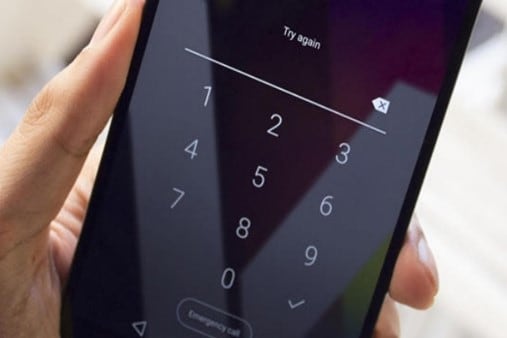
The Importance of the Android Lock System
In general, phone passwords are used to secure your device against unauthorized access and shield your files and data from it. You can try using a pattern, password, PIN, or another method to unlock your device. Although it has many benefits, there are also hazards. Risk in the sense that if you lose your device’s password or pattern, you will be unable to access it and will be stuck somewhere.
Several firms are making Android phones, so why shouldn’t more? Because Android phones are in high demand, numerous new businesses are now producing them. We can see that more people than any other operating system use mobile devices with Android. With an Android phone, we can do many functions, be constantly connected to the outside world, and everything runs smoothly.
This is an important issue that needs to be resolved right away. Therefore, some methods can assist you in getting out of it, one of which is doing a factory reset. They believe this is the most effective and secure way; thus, many try it. What about the information you have on the Oppo A38 device, though? What should you do next because a factory reset will destroy your data?
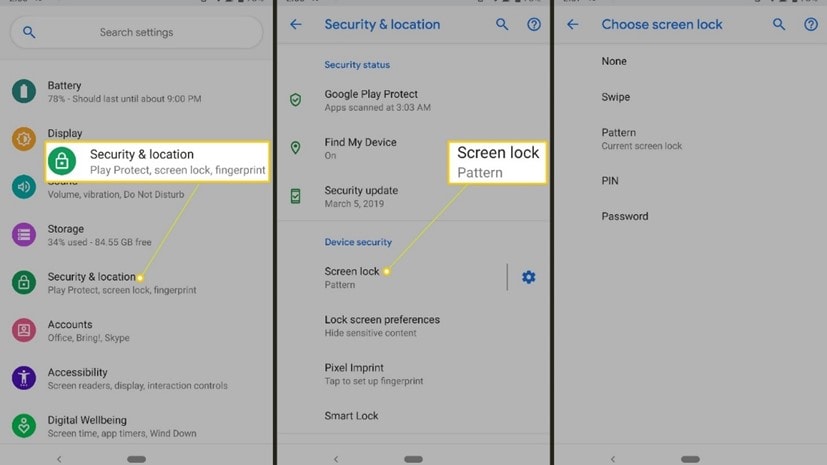
Methods to Recover Forgotten Password or PIN
1. Google Smart Lock
If you have added a trusted area or device in Google Smart Lock, you can go to that trusted area and reset your password. Alternatively, you can also use trusted devices to unlock your device.
2. Google Find My Device
As you are likely aware, every Android device is connected to a Google account. As a result, if you’d like, you may also use it to unlock Android. You’ll need to know your Google account login information for this. When you’re ready, use these instructions to find out how to unlock a phone password.
- Login using your Google credentials by going to the official Google Find My Device website.
- You will see the gadgets connected to your Google account as you enter the interface and a map of where they are.
- To wipe the Oppo A38 device, click the ERASE DEVICE option on the left side panel. You will then be required for your password.
- Once more, select “Erase.” This will reset the Oppo A38 device and get rid of the forgot pattern lock.
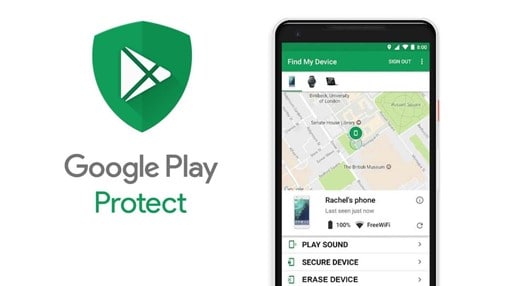
3. Recovery Mode
Users of Android smartphones and tablets can troubleshoot various issues with their devices using a feature known as Android Recovery Mode. If you discover that your device is functioning strangely, it might be helpful. Recovery Mode Android technically refers to a unique bootable partition with a recovery application installed inside it.
However, users can also use it to reset the android password if it is forgotten. The instructions for resetting android devices through recovery mode differ for every android device.
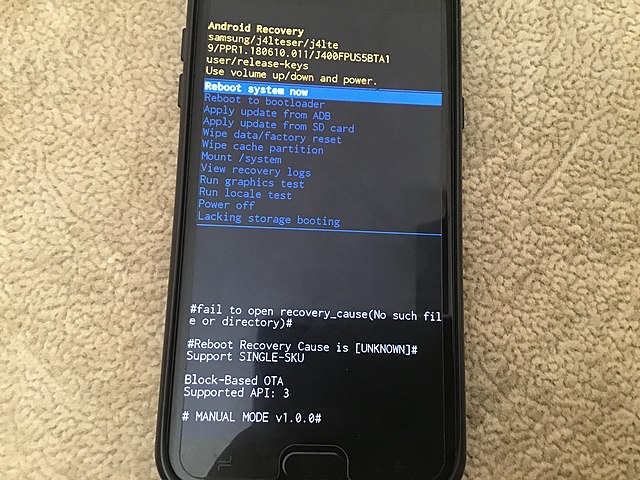
4. Dr.Fone - Screen Unlock
On most Android handsets, it is wise to give it a try on Dr.Fone to unlock the screen lock easily. It allows you to remove the password, PIN, pattern, and fingerprint from an Android phone.
Step 1. Select Unlock Android Screen
Please select “Unlock Android Screen” to ensure you have the correct unlock process.
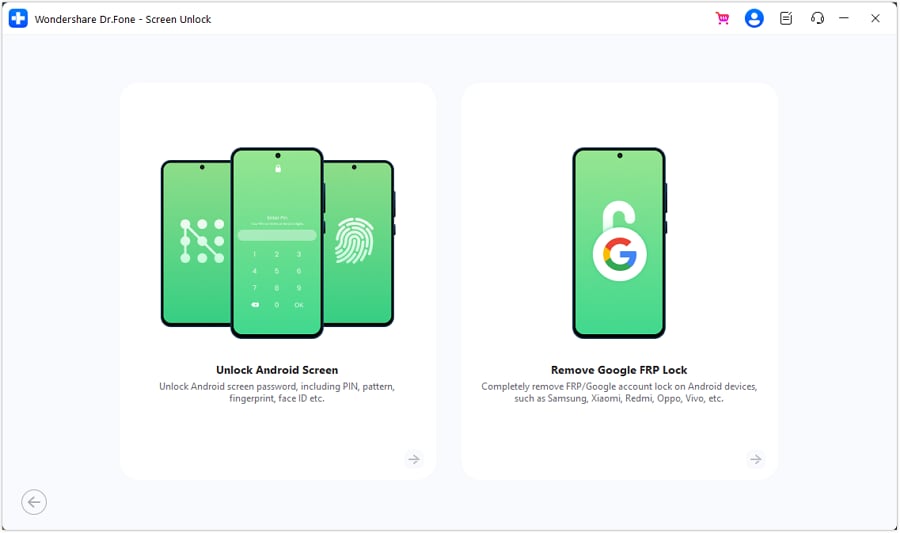
Step 2. Select device model
If you see this page, please choose the option fitting your phone, otherwise, you can’t unlock your device as you wish.
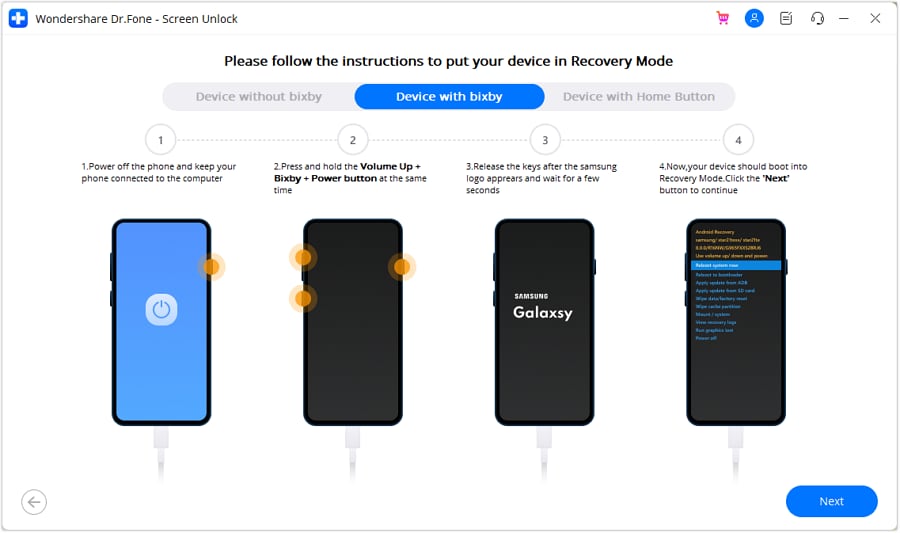
(Enter Recovery Mode via the Samsung phone with Bixby)
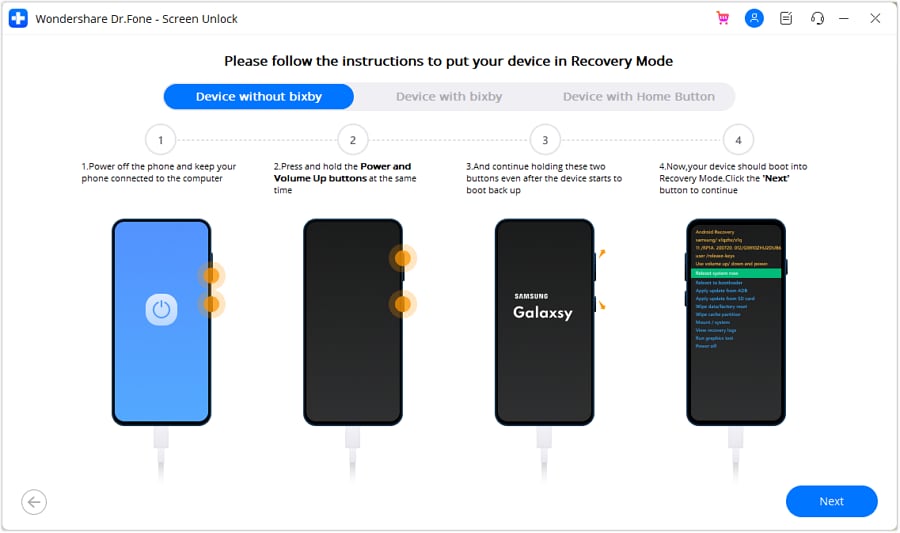
(Enter Recovery Mode via the Samsung phone without Bixby)
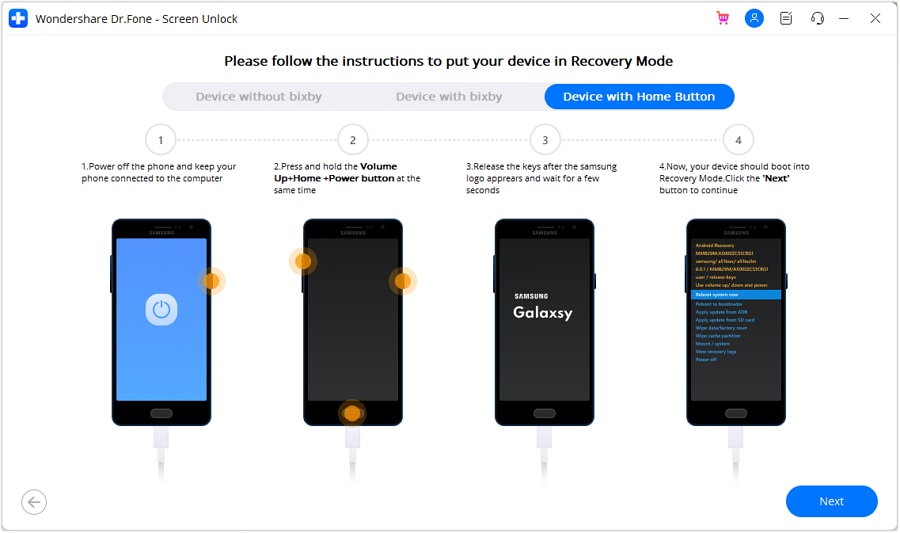
(Enter Recovery Mode via the Samsung phone with the Home button)
Step 3. Instructions to Wipe Cache Partition
On the page Recovery Mode, it’s the most important step to unlock your device. Please click the right buttons.
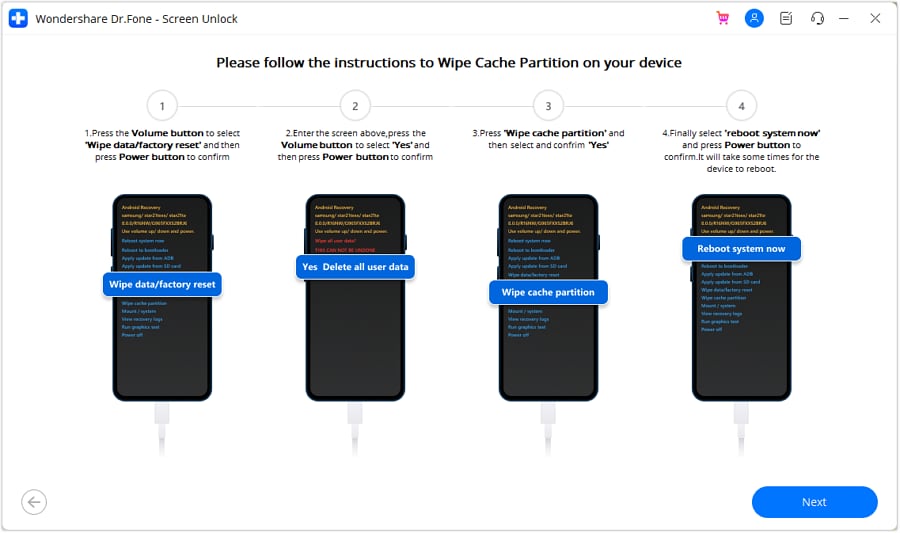
Congratulations! Now you can access your phone again, and there’re no obstacles when you do anything on your phone.
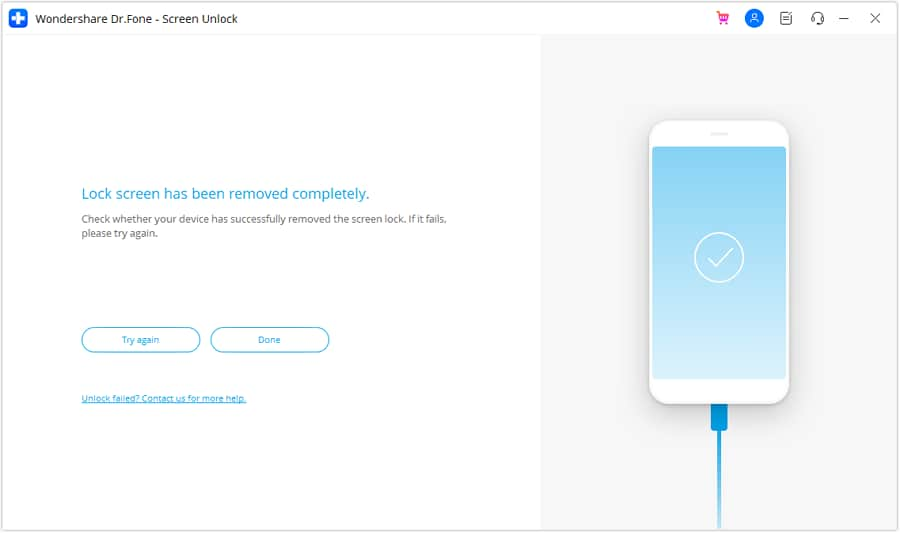
FAQs
- Will Dr.Fone - Screen Unlock Do Harm To My Oppo A38?
Answer: No, Dr.Fone is safe for your device, all hardware will be safe, and you can still use your phone as usual when you try our products, but for devices other than Samsung and LG, you may have to face data loss. So, if you want to keep your data safe, please have a backup on your phone.
- How To Keep My Data Safe?
Answer: Dr.Fone - Phone Backup is a good option for backing up the sensitive data on your device. If you want to know more, don’t hesitate and find any required information on our website.
Conclusion
Any methods mentioned above can work to overcome the obstacle of unlocking the screen with your Android handset. The best thing about all methods we said is that you just need some easy ways to complete the tasks.
How to Show Wi-Fi Password on Oppo A38
Since the invention of Android OS in 2008 by Andy Rubin, our world has faced a dramatic change. Android seems to be controlling a considerably high portion of our life. We have bought many gadgets that use this amazing OS and most of which are phones. But how much can you do with your Android phone? Developers are always making it more interesting to use this interface.
Most of the time, we use Android phones, we get faced with the need to access the internet. The Wi-Fi capability of these Android gadgets makes it super easy for us to surf the web. Throughout using Wi-Fi, we connect to a number of them. This could be at school, a sub-way café, the gym, buses, hospitals, hotels, towns, and the list is endless. A password secures most of this. Needless to say, our brain is weak to store all these passwords for future use, especially if you would want to connect with a different gadget you have recently bought or even your laptop. In this article, we will introduce you to how to find wifi password on rooted and also unrooted Android devices.
Part 1: Show Wifi Password on Rooted Android Device
What is Rooting?
First of all, what does rooting mean? You have probably used a Windows computer or even Linux. For the case of Windows, when installing a new program or software, it always prompts a dialog box saying, “Administrator permission required to run this program.” If you don’t have the administrator permission, you won’t install the program. In Android, this is called rooting. In simple terms, it means having the root permission to your phone. Some Android apps will require you the root permission, e.g., flashing your ROM. In this part, we will explain how you can show the Wi-Fi password on your Android with root.
To find the Wi-Fi passwords on your Android phone, you need to have an app to explore files which also supports a root user. In this case, ES FileExplorer or Root Explorer will come in handy. However, it turns out that the latter is offered at $3. Let’s use the free ES File Explorer.

Steps of getting Wi-Fi password on Android with root
In only four steps, we, at this moment, learn how we can find the password of a Wi-Fi on an Android phone.
Step 1: Install the ES File Explorer
Download the ES File Explorer from your play store, install it, and open it.

Step 2: Enable Root Explorer
The root explorer needs to be enabled so that you can reach the root folders of the Wi-Fi passwords you need. By default, the root feature in this ES explorer is not enabled. To enable it, just tap on the list menu on the top left corner.:
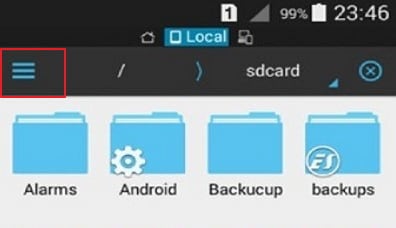
This will drop down a list of controls. Scroll down and find the Root Explorer option and enable it.
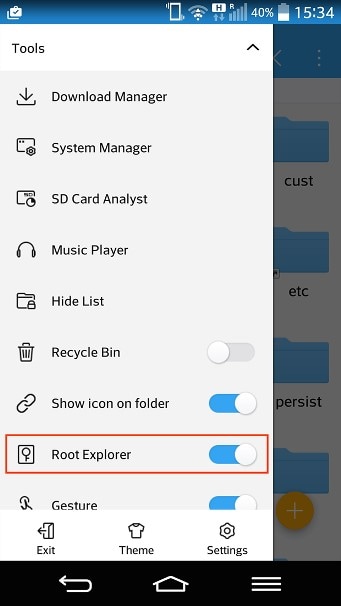
Step 3: Get the passwords’ file.
Go back to ES file explorer, and this time, find the folder named data.
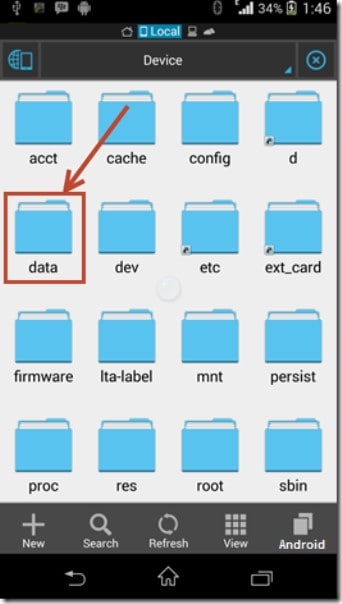
When this folder opens, find another one named misc. Open it and find another one named wifi. Here, find a file named wpa_supplicant.conf.

Step 4: Retrieve the wifi password on Android
Make sure that you don’t edit anything in the file. You might mess up with important data and fail to access the Wi-Fi(s) in the future.
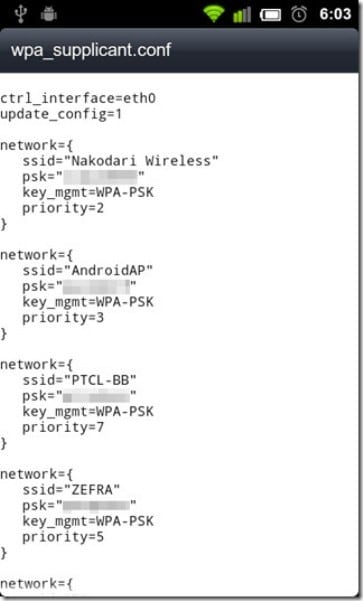
As you can see above, we have found the Wi-Fi passwords on the android device. On each network profile, we have the name of the network represented by name (ssid=”{the name}”), the network’s password represented by psk, the network’s access point represented by key_mgmt=WPA-PSK and its priority represented by priority.
Part 2: Show Wifi Password on Android without Root
What if I don’t have root access to my Android, can I still see Android Wi-Fi password? The short answer is yes. However, this is a bit involving but simple. You don’t need to be a computer guru to do it, but you need to have a computer and some internet access of course. The key thing is to find a way through which we can fetch the password file from the phone without using a root access protocol in the Android. This is made possible by some little programming insight using the Windows Command prompt.
Steps to show Wi-Fi password on Android without root
Step 1: Access the Developer authority
To access the files that Android uses to run passwords, you must first become a developer. This is very simple.
Get your Android phone and go to settings. Scroll down and find “About phone.” Tap on it and scroll down again to find Build number.

Tap on this “build number” 5 to 6 times until a message pops up, saying, “You are now a developer”.
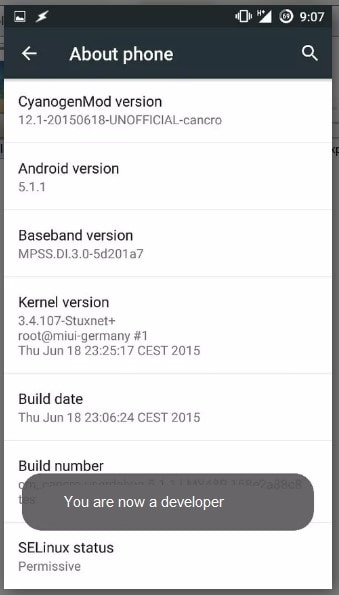
Step 2: Enable the debugging.
Go back to Settings. Scroll down for developer options. Turn on the button for “Android/USB debugging”.
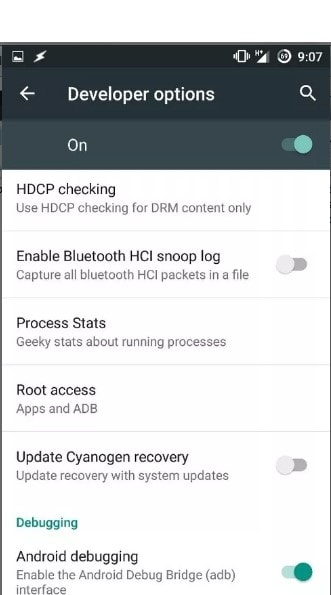
Step 3: Install ADB drivers.
Now, open your Windows desktop. Download and install ADB drivers. (Use this download link adbdriver.com ). You need to download and install platform tools (minimal ADB and fastboot) from http://forum.xda-developers.com/... Now open the folder where you’ve installed the above tools. By default, it is in the Local disc C\windows\system32\platform_tools location. However, you might want to locate them by searching on the windows search engine. You have to hold the Shift key and right-click inside the folder to click on”Open Command Window Here.”

Step 4: Test the ADB
Here, we would like to test whether the ABD is working properly. To do this, connect your phone to the PC using a USB. In the command prompt, type adb services and then press enter. If it’s working properly, you should see a device on this list.

Step 5: Find the Android wifi password.
Now, it is time to type the given command in the command prompt and type: adb pull /data/misc/wifi/wpa_supplicant.conf c:/wpa_supplicant.conf. This will fetch the file from your phone to the local disc C drive of the PC.
Step 6: Get the wifi passwords.
Lastly, open the file with a notepad, and there you go.
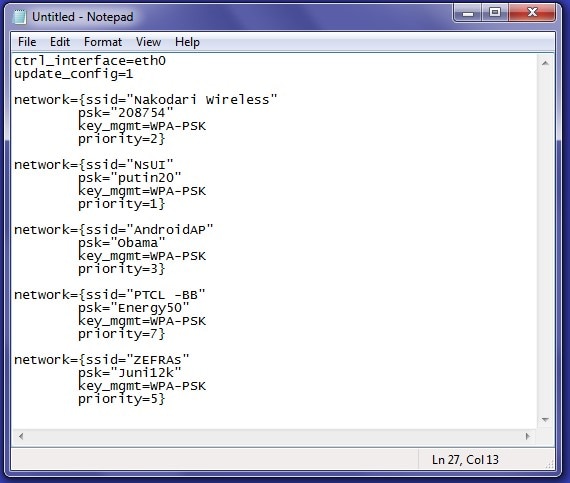
Now you learned how to show the wifi password on your Android device.
The Top 5 Android Apps That Use Fingerprint Sensor to Lock Your Apps On Oppo A38
In addition to passwords and patterns, the fingerprint scanner is one of the hottest features on leading phones of today to lock apps with fingerprint Android. The Fingerprint scanner is the latest fashion in smartphones. You would have observed that with fingerprint scanner going middle-of-the-road, many of the new low-priced phones have also been furnished with this new feature. Although the foremost purpose of the fingerprint scanner is to lock or unlock Your Oppo A38, it can also be utilized to lock and unlock your mobile applications. But not all phones are equipped with this feature. The aforesaid feature is easy to use, quick and smart.
However, if your phone has an inbuilt fingerprint scanner but it does not countenance you to lock the individual apps in your mobile with the fingerprint scanner, you do not need to worry at all! There are some apps that can add this option on your phone. And we are here to suggest you the 5 best options to lock apps with the fingerprint on your Android phones out of the many apps available in the app store! Here we go:
1. AppLock
AppLock is rated as the best one of the apps for locking apps on your Android phone. Once you download this app you will notice that it can lock apps with fingerprint practically on your Android phone. It is also capable of locking photos and videos on your device. The app features are secured when you feel that someone is trying to stealthily look at the mobile while you are unlocking your Android phone. Apart from this, you will also get the option to replace the icon so that you are capable of hiding the app. Now the bonus –You can download and use this app absolutely free for locking the apps on your iPhone or Android apps using the fingerprint.
Features:
- Invisible pattern lock
- A virtual keyboard as security.
- Free application for all iPhone and Android users
- Interactive app features with flexible storage
- Minute versions are updated automatically.
URL for Android: https://play.google.com/store/apps/details?id=com.domobile.applock&hl=en
Google Rating: 4.4
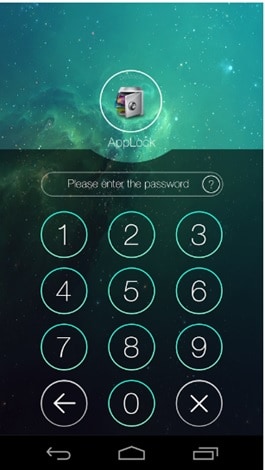
2. App Locker: Fingerprint & Pin
The subsequent name on the list of best app locks using lock apps with the fingerprint on your Android phone is App Locker. Most of the functions and features of this app are similar to the app lock. This lock apps with fingerprint iPhone have a tricky feature though, want to know? This naughty app, along with the app lock facility (using PIN, password, or fingerprint sensor), can trigger a sham crash screen which will trick the impostors to think that your phone is crashed! Isn’t it interesting? One more thing to interest you – it is also free to download and use.
Features:
- You can lock your galleries, social media apps, message app using a pin.
- The Applock has a feature to take the picture of unknown users if they tried to open up your Android phone.
- You can set up a fake app pattern.
- Possibilities to lock according to time session.
- The lock engine is updated instantly.
URL for Android: https://play.google.com/store/apps/details?id=com.gamemalt.applocker&hl=en
Google Rating: 4.5
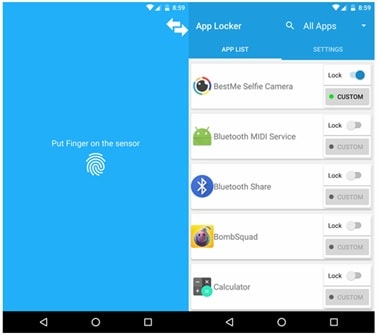
3. FingerSecurity
The next on the list is FingerSecurity - one of the feature-rich lock apps with fingerprint Android available for free download for your Android phones. You can lock practically any application with the help of FingerSecurity. In addition, it also has the knack to unlock multiple apps on a single go. If you are among those few people who have many locked apps, you are going to like this a lot! But one thing that you cannot negate is that despite the app being locked, the intruders may get a chance to view what is inside through the notifications. But Fingersecurity has an answer to this also – it has added a new notification locking feature!
Features:
- The widgets are equipped with enabling and disable services.
- Settings for the apps are customized.
- Apps are designed to prevent uninstalling.
- Fingerprints are hidden using UI.
- Protection for newly installed apps.
URL for Android: https://play.google.com/store/apps/details?id=com.rickclephas.fingersecurity&hl=en
Google Rating: 4.2
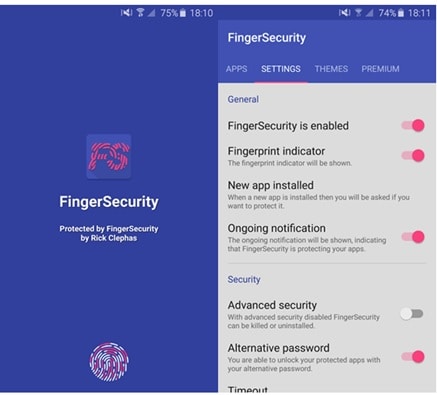
4. Norton Applock
Whenever we have heard the word anti-virus, the first name that comes to our mind is Norton. Norton is a big shot in the field of antivirus apps. Now they have also come up with free lock apps with fingerprint Android. It involves a four digits PIN or password or pattern as its lock system. It also supports icons and photos in conjunction with the apps. The app suggests you with the sanctions list which tells you which apps should be locked. Again the bonus – this is free for download on any Android devices.
Features:
- Gizmo for users who expect a more noninterventionist.
- Take the photo of illegitimate intruders.
- Solid lock apps with fingerprint iPhone.
URL for Android: https://play.google.com/store/apps/details?id=com.symantec.applock&hl=en
Google Rating: 4.6
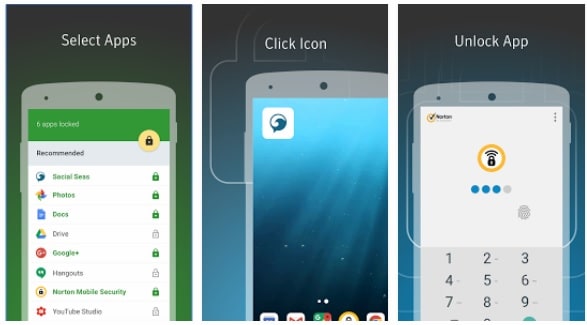
5. Perfect Applock
Perfect App Lock is yet another great lock apps with the fingerprint for Android from the basket of app locks. Like other app locks, this one also features the basics. In addition, it has special features including support for locking Wi-Fi, Bluetooth, and other buckles. It is a tough one to intrude. It tricks the bye passers-by throwing out fake errors and messages to confuse the intruders. This rather makes the thief think that there is a different issue with the phone excluding the app lock. This lock app with fingerprint Android is also available for free. The free and the paid versions offer the exact same features, except that the paid version is free from advertisements.
Features:
- Multi-windows applications are visualized.
- The sensor will support whenever you unlock apps.
- Free updating and monetizing are available.
- No limitations are applicable.
URL for Android: https://play.google.com/store/apps/details?id=com.morrison.applocklite&hl=en
Google Rating: 4.5
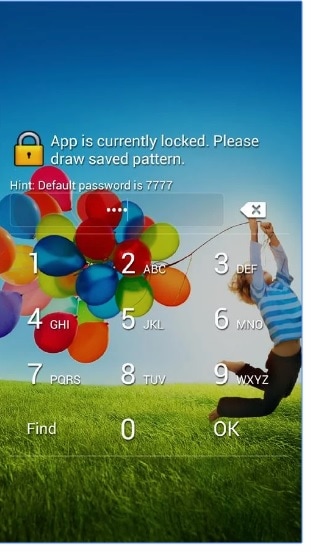
Apart from the aforesaid apps, there are many lock apps with fingerprint locking method for Android phones; however, these have been selected purely based on user ratings. If you are using the iPhone, you can have some app locks based on fingerprint sensors like 1Password, Scanner Pro, LastPass, or Mint to lock apps with the fingerprint on your iPhone.
Do you know of any other apps which can offer similar or even better features?
Do share them with us!!!
Now since we have told you about the best lock app with a fingerprint for Android that can be used to lock your apps and phone using fingerprint sensors, go ahead downloading one for your device. You can understand the pros and cons by yourself and enjoy the benefits of your downloaded app. You have got the list of five of the best fingerprint scanner apps which are available on the play store. If you have any suggestions you are most welcome to contact us.
Do not forget to share your experiences with the apps mentioned in our article. We are waiting for your response!!!
- Title: How to Remove Forgotten PIN Of Your Oppo A38
- Author: Peter
- Created at : 2024-08-02 12:38:47
- Updated at : 2024-08-03 12:38:47
- Link: https://android-unlock.techidaily.com/how-to-remove-forgotten-pin-of-your-oppo-a38-by-drfone-android/
- License: This work is licensed under CC BY-NC-SA 4.0.



